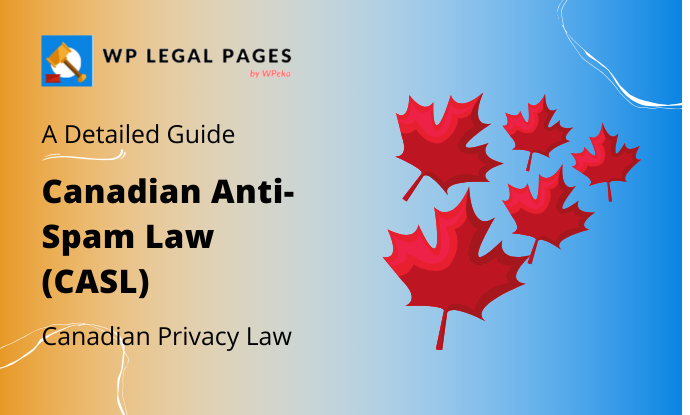A Detailed Guide On What is CASL (Canadian Anti-Spam Law)

You have to comply with CASL if you are in Canada or send a Commercial Electronic Message (CEM) to someone who is a Canadian resident.
CASL is Canada Anti-Spam Legislation regulations. It controls how organizations collect, use, and disclose personal information while operating their businesses.
For those unaware, the Canadian Anti-Spam Law (CASL) came into effect on July 1, 2014. This is the latest anti-spam law applied to electronic messages, such as texts, emails, and more, that companies send for commercial activity.
The key feature of this law is to obtain consent from recipients before sending any Commercial Electronic Messages (CEMs). However, Canadian Anti-Spam Legislation or CASL doesn’t apply to such CEMs that are directed through Canada but to Canadian as well as global companies and organizations.
In this article, we will dive more into the details of CASL anti-spam laws and why CASL compliance is important.
- What is a Commercial Electronic Message (CEM)?
- What is Consent, And How Do You Get It?
- How Does Canadian CASL Law Affect You?
- How to Comply with Anti-Spam Laws?
- How Can You Stay CASL Compliant?
- What is The Meaning of CASL For Different Executives And Officers?
- When should you begin the compliance process?
- What is required to understand compliance?
- Disclaimer
- Conclusion
What is a Commercial Electronic Message (CEM)?

Any electronic message, such as an email with a discount or informing clients about a sale or promotion, that promotes engagement in a commercial activity is considered a CEM. However, a message is not considered a CEM if it does not contain business-related content or links to websites.
CASL can only detect CEMs that are sent to an electronic address. It is not within the purview of this policy to confirm successful unsubscribes, send courtesy SMS to customers who are roaming, or publish blog entries on microblogging and social networking platforms.
What is Consent, And How Do You Get It?
As per the Canadian Anti-Spam Legislation (CASL), one of the significant laws governing email privacy in Canada, companies must obtain the consent of recipients before sending Commercial Electronic Messages (CEMs). This consent can be given either in writing or orally. Written consent can be in electronic form as well.
Also, when requesting consent, companies must provide some information to recipients, such as:
- Name of the organization or person seeking consent
- A phone number or an email ID where the recipient can contact
- A statement recognizing the person who is providing the consent
- The contact information and identity of any affiliate or third party used to get the consent
- A method to allow people to opt out automatically
How Does Canadian CASL Law Affect You?
Businesses, companies, or individuals doing business in Canada must comply with these laws. For all of the Canadian email addresses added to the list post-July 1, 2014, Canadian CASL regulations compliance needs you to get consent, either expressed or implied.
In case you fail to comply with Canadian email privacy laws, you would have to face severe penalties that may comprise civil charges, criminal charges, personal liability for the company’s directors and officers, and fines up to $10 million.
How to Comply with Anti-Spam Laws?
It is crucial to understand consent under Canada’s Email Privacy laws and Anti-Spam legislation for both individuals and businesses.
According to Constant Contact’s terms and conditions, your email list must be made up of subscribers who have given you permission to email them. You must also comply with email laws that prohibit unsolicited emails.
- To upload contacts, you must agree that you have acquired the consent of every recipient before sending an email
- Your “From” email address is verified and precisely identifies the sender
- Turn the Advanced Email Permissions setting so you can specify if contacts added to the account have provided permission
- You would have to include the postal address in the email campaign, and Constant Contact needs you must add the physical address before scheduling the email.
- Ensure that the address is valid for the organization
- Constant Contact includes an obvious and clear method for contacts to opt out of future emails.
- Constant Contact processes unsubscribe automatically from emails

How Can You Stay CASL Compliant?
Adhering to the law when starting a business is relatively easy. However, when you have established, staying compliant could be challenging. So, to do that, here are a few steps that you can use to remain compliant.
- You can use the CASL template to obtain express permission from contacts who have only given implied permission under the Canada Anti-Spam Legislation (CASL).
- Please ensure that any unsubscribe request received through email is promptly honored.
- Ensure that your email campaign’s subject line is concise and straightforward.
- Don’t offer any misleading offers. For instance, don’t showcase 50% off in the subject line and offer just 20%. This is strictly against the CASL law.
- After receiving email addresses through implied permission, they must be deleted after two years unless express permission has been granted to send emails.
- Enable your contacts to choose a list by activating the Update Profile Form.
- You should maintain an audit trail of how and when consent was acquired. It is best to record as much information as possible.
What is The Meaning of CASL For Different Executives And Officers?
When it comes to various positions, CASL affects different people in a different manner. Here is how it goes:
- Marketing Executives / CMO: These people have to evaluate the effect of CASL on digital marketing campaigns, such as those that run through social media and email. CMOs and marketing executives should also evaluate how to acquire consent from prospects to talk to them.
- Internal Auditors: They must assess CASL compliance once the business has started its functions and operations.
- Chief Legal Counsel: A chief legal counsel would have to review the requirements of the act, changing rules and commentary from the associations of the functional industry. Post this, regulatory guidance and explanatory guidelines should be monitored as per the release by the government.
- Risk Officer: A risk officer must evaluate the CASL non-compliance risks on the work and business front.
When should you begin the compliance process?
Generally, Canada CASL regulations comprise a substantial amount of work for most organizations, right from reviewing legal implications to comprehending resources across the affected business.
The process of addressing gaps in governance, technology, process, and people can be time-consuming for larger organizations with multiple business channels and lines. It is therefore recommended to start the process as early as possible to avoid any last-minute issues.
What is required to understand compliance?
To comply with this law, you must thoroughly understand a few major things:
- The CASL act
- The regulations of CRTC
- Two different sets of CRTC Interpretation Guidelines
- New Industry Canada regulations
- The Industry Canada Regulatory Impact Analysis Statement
If you wish to ensure compliance with regulations and laws worldwide, not just with CASL, you can use the free privacy policy generator provided by WP Legal pages.
This plugin can assist you in creating policy pages such as privacy policies, terms and conditions, Amazon affiliate policies, disclosure pages, and many more.
Even without legal experience, create legally valid documents customized to unique website or business needs with the plugin’s user-friendly interface.
Here are some recommended legal pages for WordPress websites in the context of CASL compliance with the help of WP Legal Pages Plugin.
Privacy Policy
- Outline the collection, use, and disclosure of personal information.
- Specify how user data is handled, stored, and protected.
- Clearly state the purpose of collecting information and obtaining user consent.
Terms of Service (Terms and Conditions)
- Define the rules and guidelines for using your website or services.
- Address user responsibilities, limitations of liability, and dispute resolution.
- Clearly communicate any terms related to transactions or purchases.
Cookie Policy
- Disclose the use of cookies and other tracking technologies.
- Explain the purpose of cookies and how users can manage their preferences.
- Comply with regulations regarding online tracking and user consent.
Email Marketing Consent Form
- Clearly present opt-in options for email communication.
- Provide information on the type of content users can expect to receive.
- Include an easy-to-use unsubscribe mechanism to comply with CASL requirements.
Disclaimer
- Clarify the limitations of liability for the information provided on the website.
- Inform users about the accuracy and timeliness of content.
- Address any potential risks associated with using the information on the site.
By incorporating these legal pages into your WordPress website, you not only enhance the legal compliance of your online presence but also foster a transparent and trustworthy relationship with your audience.
Conclusion
Understanding and complying with the Canadian Anti-Spam Legislation (CASL) is crucial for businesses and organizations operating in Canada or targeting Canadian audiences. CASL imposes strict regulations on electronic communications, including email marketing, and failure to adhere to its provisions can result in significant penalties.
To ensure compliance with CASL and to establish a solid legal foundation for your website, incorporating well-crafted legal pages is essential.
We recommend using WP legal pages plugin, which can provide transparency, build trust with users, and demonstrate a commitment to legal and ethical standards.
If you liked reading this article, don’t forget to read our other engaging articles:
- Do I Need A Privacy Policy For My Website? – A Beginner’s Guide
- How To Add Copyright Text To A Website
- Uncover Cookie Analytics: What Are Analytical Cookies?
Are you excited to create legal pages for your website and gain the trust of your visitors? Grab WP Legal Pages now!
